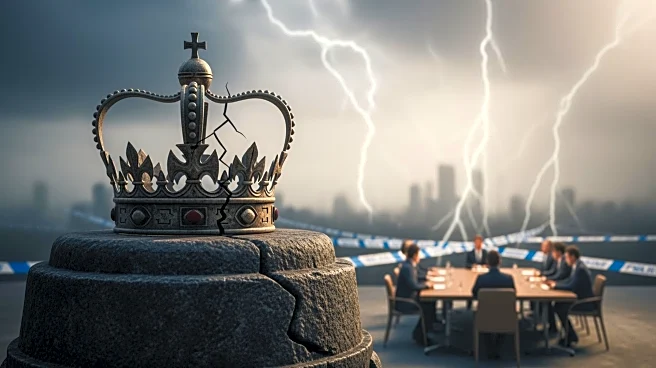Rapid Read • 8 min read
Federal prosecutors have not secured a felony indictment against Sean Charles Dunn, who was caught on camera throwing a sandwich at a Customs and Border Protection agent in Washington, D.C. Dunn, who was previously employed as an international affairs specialist at the Justice Department, was arrested following the incident. The case is part of the legal challenges arising from President Trump's law enforcement surge in the capital, which has resulted in over 1,000 arrests. The refusal of the grand jury to indict Dunn is considered unusual, as grand juries typically return indictments when prosecutors present sufficient evidence. The incident occurred shortly after President Trump's order to deploy federal agents and troops in Washington, leading to Dunn's arrest and subsequent firing from his position.
AD
The failure to indict Dunn highlights potential issues with the federal government's approach to law enforcement in Washington, D.C. Critics, including defense lawyers and federal judges, have raised concerns about the federal handling of arrests that might typically fall under local jurisdiction. This case, along with others, underscores the tension between federal and local authorities in managing public safety and legal proceedings. The decision not to indict could influence how similar cases are prosecuted in the future, potentially leading to more misdemeanor charges rather than felonies. The broader implications may affect public perception of federal law enforcement's role in local matters and could prompt discussions on the balance of power between federal and local jurisdictions.
Prosecutors may attempt to refile the charge against Dunn as a misdemeanor, following the grand jury's decision. The case could set a precedent for how similar incidents are handled, particularly those arising from President Trump's law enforcement initiatives. Legal experts and civil rights advocates may continue to scrutinize the federal government's approach to arrests and prosecutions in Washington, potentially leading to policy changes or legal challenges. The outcome of Dunn's case may also impact future interactions between federal agents and local residents, influencing public sentiment and law enforcement strategies.
The refusal to indict Dunn may reflect broader concerns about the federal government's intervention in local law enforcement matters. This case could spark debates on civil liberties and the appropriate scope of federal authority in maintaining public order. The incident also raises questions about the effectiveness and ethics of deploying federal agents in response to local unrest, potentially influencing future policy decisions and public discourse on government accountability.
AD
More Stories You Might Enjoy











